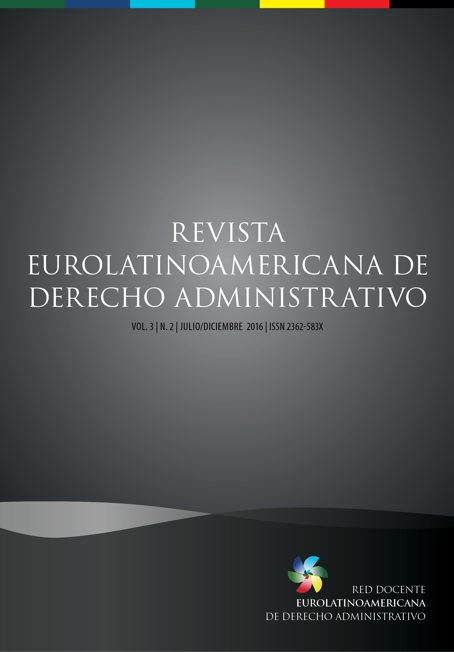The social role of urban law
DOI:
https://doi.org/10.14409/rr.v3i2.7118Keywords:
urban law; right to the city; urbanization; planning; citizen participation.Abstract
The ideas presented in this paper are intended to reflect on the role, responsibility or, in terms of the Royal Spanish Academy, the moral obligation of urban law to regulate the city's ordering its balanced, sustainable development and equity, avoiding the marginalization, segregation and exclusion. To this end, the authorities must prevent urbanization from being a territorial expression of an exclusive and predatory urban order. The regular exercise of planning power must promote the right to urbanization, as a right of collective action, a corollary of the right to a decent habitat, consist in the progressive satisfaction of the urban and housing needs of the people of the city, especially who can not solve them with their own resources. In urbanization processes, they should tend to progressively satisfy the right to live in dignity on served or urbanized land, as a corollary of the respect by the public authorities of the human right to the city, consisting in the use and enjoyment of these within the principles of sustainability, democracy, equity and social justice, and the observance of guiding principles such as the social function of property, democratic management of the city and access to land.
References
ÁLVAREZ, Ing. Raúl D. Hábitat y asentamientos irregulares en Rosario. Publicación del Consejo Económico y Social Rosario. Disponible: <http://ceysrosario.org/wp-content/uploads/2014/07/Power-Asent-Irreg.pdf>.
ARGENTINA. Constitución Reformada de la República Argentina de 1994.
ARGENTINA. Corte Suprema de Justicia de la Nación. Halabi, Ernesto c/ P.E.N. - ley 25.873 dto. 1563/04 s/ amparo ley 16.986.H. 270. XLII, Buenos Aires, 24 de febrero de 2009.
ARGENTINA. Corte Suprema de Justicia de la Nación. Zarate Villalba, Juan Ramón y Otros c/ G.C.B.A. s/ Amparo. Magistrados: Daniele - Centanaro - Juan Lima. Id SAIJ: F.14370076. 30 de septiembre de 2014.
ARGENTINA. Corte Suprema Justicia de Santa Fe, “Francisco C. c. Comuna de Videla”, 21/02/1996.
ARGENTINA. Plan Urbano Rosario 2007-2017. Disponible en: <http://www.rosario.gov.ar/web/ciudad/planeamiento-urbano/plan-urbano-rosario/libro-plan-urbano-rosario-2007/2017>.
BORJA, Jordi. Conferencia en la Universidad Nacional de Rosario, y publicada por la Municipalidad de Rosario en Cuadernillos de la Secretaría General de la Municipalidad de Rosario.
CASSAGNE, Juan C. Derecho Administrativo. t. II. Buenos Aires, 1998.
EKMEKDJIAN, Miguel A. La protección judicial de los intereses difusos en el Derecho constitucional argentino. Disponible en: <http://www.cepc.es/rap/Publicaciones/Revistas/8/AIB_003_075.pdf>.
FERNÁNDEZ, Tomás-Ramón. Manual de Derecho Urbanístico. 12. ed. Madrid, 1997.
FORO SOCIAL DE LAS AMÉRICAS. Carta Mundial del Derecho a la Ciudad. Quito, julio. 2004. Disponible en:
GORDILLO, Agustín. Tratado de Derecho Administrativo. t. II. p.15. Buenos Aires.
GUDIÑO, María Elina. Del urbanismo reglamentario a las nuevas concepciones de ordenamiento territorial. Scripta Nova Revista Electrónica de Geografía y Ciencias Sociales Universidad de Barcelona. ISSN: 1138-9788, Depósito Legal: B. 21.741-98, v.14, nº331, ago. 2010.
LEFEBVRE, Henri. Le droit à la ville. In: L Homme et la société, N. 6, 1967.
LÓPEZ, Miguel Martínez. La participación social en el urbanismo, en los límites de la realidad. Disponible en: < http://habitat.aq.upm.es/boletin/n34/ammar.html>.
NARDEO, José Manuel. El modelo inmobiliario español y sus consecuencias en Ciudades, una ecuación imposible. BELIL, Mireia. BORJA, Jordi Borja; CORTI, Marcelo (Editores). Colección Urbanidad. Fundación Fórum Universal de les Cultures. Barcelona: Editorial Café de las Ciudades, 2012. p. 94.
PETEREK, Michael. Architect and Urban Planner, Faculty 1: Architecture - Civil Engineering – Geomatics, Fachhochschule Frankfurt am Main - University of Applied Sciences. Citado en Revista de Urbanismo - ISSN 0717-5051- Disponible en: <http://revistas.uchile.cl/index.php/RU/index>.
REESE, Eduardo. Instrumentos de Gestion Urbana. Disponible en: .
TALLER, Adriana; ANTIK, Analía. Curso de Derecho Urbanístico. Santa Fé: Rubinzal-Culzoni Editores, 2011.
TALLER, Adriana. El acceso a la vivienda digna: principio rector de las políticas públicas de inclusión social y gestión del suelo. Revista Eurolatinoamericana de Derecho Administrativo, Santa Fe, vol. 1, n. 1, p. 7-37, ene./jun. 2014.
TALLER, Adriana. El Derecho Urbano tiene vocación para habilitar el pleno ejercicio del derecho a la ciudad. In: BACELLAR FILHO, Romeu Felipe; GABARDO, Emerson; HACHEM, Daniel Wunder (Coord.). Globalização, direitos fundamentais e direito administrativo: novas perspectivas para o desenvolvimento econômico e socioambiental: Anais do I Congresso da Rede Docente Eurolatinoamericana de Direito Administrativo. Belo Horizonte: Fórum, 2011. p. 57-71.
Downloads
Published
How to Cite
Issue
Section
License
Authors who publish in this Journal agree to the following terms:
- Authors retain copyright and grant the Journal of Constitutional Research the right of first publication with the article simultaneously licensed under the Creative Commons - Attribution 4.0 International which allows sharing the work with recognition of the authors and its initial publication in this Journal.
- Authors are able to take on additional contracts separately, for non-exclusive distribution of the version of the paper published in this Journal (eg.: publishing in institutional repository or as a book), with a recognition of its initial publication in this Journal.
- Authors are allowed and encouraged to publish their work online (eg.: in institutional repositories or on their personal website) at any point before or during the submission process, as it can lead to productive exchanges, as well as increase the impact and the citation of the published work (see the Effect of Open Access).



























.png)





